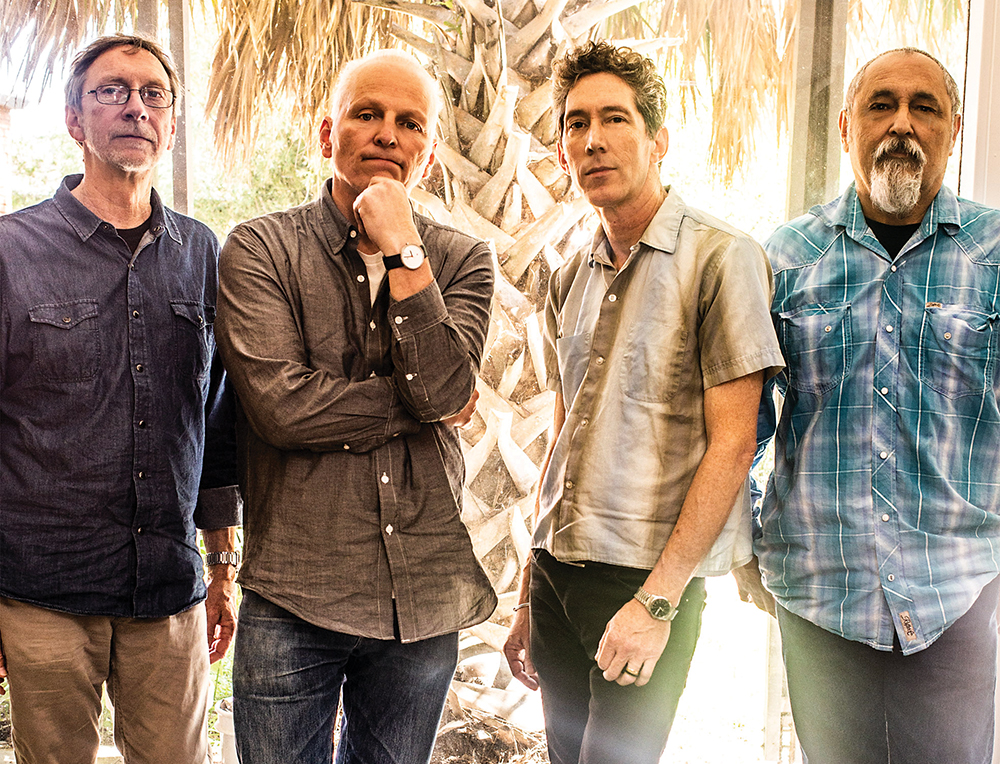If The Iguanas played at Railgarten this Saturday, as planned before Covid intervened, it wouldn’t exactly have been a homecoming. But it would have felt like one. While only drummer Doug Garrison grew up in Memphis, they all savor the musical ethos that Memphis shares with their home base of New Orleans. For Garrison, it’s an ethos he lives every day. “Memphis and New Orleans are so closely tied, culturally and historically,” he says. “They’re the cradle of American music.”
It shows in the rich gumbo of influences that The Iguanas explore, proffering a lean, hard-rocking (and often horn-driven) take on Chicano rock, R&B, blues, jazz, conjunto, cumbia, and more.
The Chicano element comes via the band’s two singers, Joe Cabral and Rod Hodges, whose families both have deep Mexican roots, but the overall blend springs from New Orleans itself. It was something that drew Garrison to the Big Easy when he left Memphis 30 years ago to join the band. “I was never really aware of how important Caribbean music was to jazz in New Orleans until I moved down here. I got turned on to a lot of different stuff. I had to shed [practice] some new styles, like the cumbia and Mexican styles like the polka. I’d never played those before.”
Even before moving there, Garrison often played in New Orleans with The Iguanas’ bass player, René Coman, and even today one hears echoes of the pair’s previous collaboration, backing up native Memphian Alex Chilton. By then, Chilton had settled in the Crescent City permanently, and his eclectic, historically informed tastes deeply affected both Coman and Garrison.
“The Iguanas cover a lot of styles, and the challenge is staying true to the approaches of each genre,” reflects Coman. “There were a lot of things that I learned from Alex, that maybe took me a lifetime to really manifest, and one of those things was Alex’s understanding of these different bags and how they are their own little world. All this stuff within them is precious and important to making it what it is. We became dedicated students of these bags, understanding the language, the vocabulary of each form. It’s interesting — it’s a treasure hunt.”
That treasure hunt took them up and down the Mississippi and beyond. “When I started playing with Alex and René, they were both living in New Orleans, and I was living in Memphis, and we were back and forth all the time,” Garrison says. “Alex had strong roots in Memphis, but he loved being in New Orleans. He would take me around and turn me on to stuff. The R&B and jazz, and how it dances together.”
For Garrison, the key word is “dances.” As he puts it, “I used to tell people, ‘We’re a dance band.’ When The Iguanas started out, it was all about being a social band and having people come out to dance and party. Because when we start playing, people start moving.”
And yet The Iguanas are a dance band with compelling songs — another similarity with the rhythm section’s 10 years with Chilton. This not only shows up in The Iguanas’ own material, which has grown into an impressive catalog after 30 odd years, but in the other singers they collaborate with. Memphis’ own Will Sexton used them as a backing band on his album, Don’t Walk the Darkness.
As Coman says, “The Iguanas have always loved being a backing band. We pride ourselves on that. If someone sits in with The Iguanas on one of our gigs, we make sure to call something that they’re really going to shine on. We tee them up, so people can say, ‘God, I love that guy, but I’ve never heard him sound better than that.’ Good — that’s what we want to do.”
